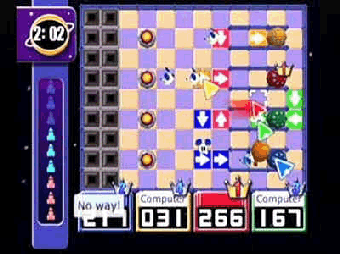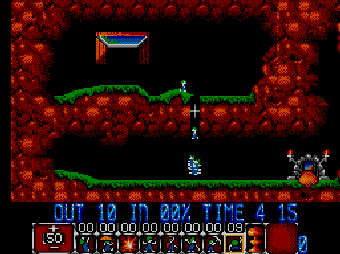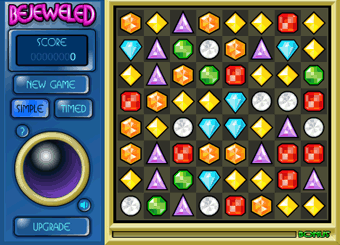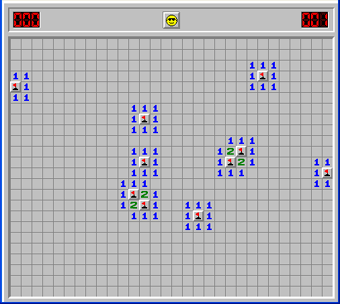GameCola fans and writers describe their favorite (and sometimes least favorite) games of all time.
Lisa Harrison’s Top 10 Most Addictive Puzzle Games Of All Time
The puzzle game addict is elusive by nature, yet easy to spot if you are aware of the signs. It could be the calm-mannered office worker in the cubicle next to you, seemingly hard at work but for his sporadic pained grunts and furious mouse-clicking. It could be the girl sitting next to you on the train, whose attention never leaves her beloved Game Boy even when she shuffles past you to disembark at her local station. The likelihood is that there is at least one person in your life right now who is a closet puzzle game addict. A terrible affliction, I think you’ll agree, but oh so wonderful to suffer from.
The games listed below comprise the most addictive of the genre. They enthralled countless gamers for hours at a time, and left converts to the genre begging for more.
10. Snake (Mobile): Scenario: You’re on the move with nothing to do when boredom sets in and there’s nothing immediately available to cure it. What do you do? Get out your mobile for a ‘quick’ game of Snake.
You know it won’t really be a quick game. You know that hours later you’ll run out of power and that will be the only end to it. And yet you kid yourself that it really will be ‘quick’ and that you won’t immediately start playing another game as soon as the snake grows too big for the screen and it’s game over. It’s the kind of vicious cycle that never ends, and Snake is the kind of vicious game that makes you unable to stop playing. Long after passing the point of no return when you have in all likelihood achieved the highest score it’s possible to achieve, you’ll still be playing. Poor, poor you.
9. ChuChu Rocket! (DC): With a thriving online community in its heyday, ChuChu Rocket is one of those games where you really have to fear for the sanity of its creators as well as for the well-being of its slavish devotees. The concept is to lead space mice to awaiting rockets whilst avoid them being eaten by bodiless cats on a grid by rotating static sets of arrows.
Not as easy as it sounds by any means, and a common means of destruction for Dreamcast controllers internationally upon them being thrown out of the nearest available window during some of the more difficult levels. And yet even following this frustration, you’d be running into the garden to retrieve the controller and come back quickly to the console, salivating at the prospect of solving whichever level got the better of you.
8. Mighty Beanz (GBA): Why this is so addictive, I do not know. It isn’t necessarily the quality of the game. It isn’t the nature of it either. Rather, it seems to be a combination of fascination with what should be an easy game coupled with the unwillingness to accept that what starts as an easy game becomes almost impossible to get through by level 30 or so. This is confusing—the first couple of levels are literally so easy that you can win without even touching the controls.
However, as the pace quickens (although the learning curve isn’t nearly as steep in this title) and increasing numbers of non-matching pairs fall to the row below, the player is left unaware of how they came to possess it in the first place and why on earth they just can’t stop playing. There are 98 levels overall—that’s one heck of a life you could potentially waste on this title. Just think of the time that you could spend in more constructive ways—to stop if you still have chance. It’s not too late to back out and it’s either that or become so captivated that you actually complete all the levels involved. Believe me—I’d know.
7. Lemmings (SMS): Lemmings are curious creatures, suicidal as they are. However, the lemmings here aren’t so much suicidal as awe-inspiringly stupid—regardless of the danger they may imminently face, they continue to march toward probable death with furiously irritating idiocy. Only you have the power to save them, by assigning them tasks to get past the various obstacles they face.
If you left them to it and stopped playing, they’d all die. Could you live with yourself if that happened? Could you? No, you couldn’t. So ignoring the fact that they’re actually sprites on your TV screen, you keep on playing like the sucker for punishment that you are.
6. ZooCube (GBA): Although not as widely played as others on this list, ZooCube’s appeal is in the fact that it’s so unlike anything else on the market. A single block hovers in the middle of the screen, with additional blocks being drawn to it in formation. The key is to rotate the central block so that corresponding colours are matched together.
Sounds simple, and it really is initially, but soon the pace quickens as with so many puzzle games and the headrush starts to occur. Dizzying speeds can be attained before the player has barely had chance to get to grips with the game, resulting in the demise of many a brain cell over its brutally compulsive qualities. The array of options alone is enough to draw in all who fall under its spell, until they become incapable of any kind of thought beyond ‘Hang on, I can get this bit!’
5. Bomberman (NES): Inspiring a multitude of sequels, remakes and advance editions, there’s nothing quite like Bomberman for monster-exploding mayhem. Unfortunately, there’s also nothing quite like it for social life reducing impulsiveness either, although some strength can be found in the fact that it does actually have an ending, and it’s not that hard to complete this particular game.
4. Bejeweled (PC): Capable of turning even the most relaxed of individuals into a fiercely competitive, salivating psychopath, this particular game involves matching rows of gems either against the clock, or by carrying on until there are no more available moves. Easier than the other games in this list, Bejeweled’s appeal is clear—pretty much anyone can play it and be relatively successful straight away.
Here, it’s the fact that everyone’s good at it that makes it so addictive—being top of the high scores list is something that anyone can achieve, but after a while it becomes more difficult to top your best performances, and this is when it becomes completely entrenched into the subconscious of the addict. ‘Just one more game’ is a common line among devotees.
3. Arkanoid (Amstrad CPC464): Known to some as ‘Break Out’, this bat and ball puzzler is perhaps the most difficult game to master and complete. Unlike others in this list, Arkanoid actually has an ending, although very few people have seen it without cheating. The root cause of its addictive qualities is simpler—it begins deceptively easily, but rapidly increases in difficulty. After the first five levels or so, the uninitiated player is left staring at the screen wondering how on earth anyone could possibly get through this game, and even then that’s assuming you make it to that point.
Due to its frustrating difficulty, this game has been known to cause grown men to cry. The very uttering of its name is enough to bring the painful memories flooding back for many a traumatised gamer.
2. Minesweeper (PC): Due to its standard free inclusion on most PCs, Minesweeper is a game which has destroyed the productivity of many a suited office worker. Simplistic by nature, its appeal is immediately apparent—anyone can play it, but it takes some serious practice to play it well.
Those for whom Minesweeper has become less of a habit and more of a way of life seem to have the best times, but there is always an urge for any addict to play just one more game to shave another one or two seconds off the clock. That is, unless you break your mouse in the process.
1. Tetris (GBO): Spawning many a clone over the years, this masterpiece was the original block-dropping puzzle game, and remains the most compelling of the sub-genre it inadvertently created. Even the theme tune became immediately popular, causing widespread arm-flailing in many a rave in the late 1980s when it was remixed and released as a single.
Initially easy in difficulty level, as the player’s score increased the level would rise, causing the blocks to fall with eye-popping speed and more often than not lead to a “Game Over” before any conceivable end had been reached. Whether or not the game even ends remains something of a mystery – few people can genuinely claim to have beaten it.
Once the puzzle game genre has you in its grip, there can be no loosening of the hold it possesses of your soul. Whilst for the sake of the player’s sanity and social life it may be better to avoid them altogether, in all likelihood a true addict is unable to let go. I’m afraid that the simple inevitability is that once you have found your own particular weakness, there really is no going back. Once addicted, always addicted. That being said, I think I’ll disappear now for “just one more game”…




